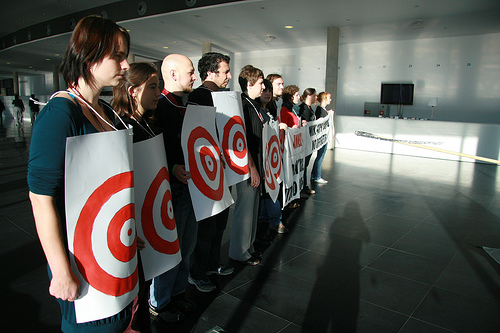Cross posted from Grist
African negotiators at the U.N. climate talks in Barcelona just refused to continue formal discussions about all other issues until wealthy countries live up to their legal and moral responsibility to commit to deep emissions reductions. Rich countries (also called “Annex 1 countries”) have ground negotiations to a halt by failing to agree their new targets under the Kyoto Protocol (KP), driving developing countries to put their feet down. This walkout is significant and opens up political space – it means many of the countries in Africa just stopped one half of the UN climate negotiation process until rich countries say how much they will reduce their carbon.
We’re down to the wire: just four negotiating days left before the big agreement in Copenhagen is supposed to go down. Its day one, and we saw just a taste of the breakdowns to come. While rich countries continue to undermine commitments for the Kyoto Protocol (one of two negotiating tracks for Copenhagen which is supposed to be renewed for a second commitment period of Annex 1 targets), the spin has already taken hold: they’re blaming Africa for their own delay-mongering. Oy vey.
 In response, movement and civil society organizations held a demonstration at the U.N. building in support of African delegates’ insistence that developed countries commit to new, strong binding targets. Delegates and observers were invited to join a human shield against the killing of Kyoto targets (complete with an Annex 1 grim reaper) and instead urged to promote at least 40% emission reductions with no offsets by 2020.
In response, movement and civil society organizations held a demonstration at the U.N. building in support of African delegates’ insistence that developed countries commit to new, strong binding targets. Delegates and observers were invited to join a human shield against the killing of Kyoto targets (complete with an Annex 1 grim reaper) and instead urged to promote at least 40% emission reductions with no offsets by 2020.
Kamese Geoffrey of NAPE/ Friends of the Earth Uganda warned, “Rich countries are attempting to dodge their legal and moral responsibilities to reduce emissions. Developing countries and communities have historically had practically no fault in the creation of climate change, yet they will be the first to face the devastating impacts of climate change.”
Many of us have longstanding criticisms of the Kyoto Protocol, particularly its market mechanisms. But here’s why Kyoto is important:
It contains a few core provisions and basic justice frameworks that the U.S. and other Annex 1 countries are trying to avoid.
1) Compliance. This means the international community evaluates whether or not you’ve come through on your commitments, and they are set to a specific time period.
2) Overall targets (aka top-down target setting). This means the international community decides what the targets for C02 reduction are, and then divide up responsibilities accordingly. Equity and science decide. The U.S. wants the opposite – each country consulting with industry to see what it thinks it can muster, and then we just see where we land.
3) “Common but differentiated responsibilities.” This is the most important framework to save. It means that the industrialized countries caused the problem of global warming, and the Global South is dealing with the worst of the impacts first (droughts, floods, famines, hurricanes, etc are all hitting the equator now in ways that will only come to the rest of the world later). In order for the Global South to reduce emissions, they need finance and technology from industrialized countries or else we are robbing them of their right to develop – there just isn’t space for everyone to follow the North’s dirty development path. “Ecological debt” is one way to think about it. This is the most basic framework of justice, which is what people mean when they say “the North must lead” and why the idea that both Annex 1 and G77 countries “need to act together” is actually a deeply corrupt and unjust framework.
The idea that we can somehow replace a legally binding instrument with a voluntary pledge system is insanity. In 1997 when the KP was first ratified, it had been watered down tremendously in the hopes of getting the U.S. to sign. The U.S. didn’t sign (though it remains party to the convention). Yet under the Bali Action Plan, agreed to in December 2007, the US is required to take on comparable efforts to other Annex 1 countries under the KP – which means that in theory, the rest of the world could continue the KP, and the U.S. would have to come along whether it signs or not. Instead, we’ve seen a race to the bottom – other Annex 1 countries hiding behind U.S. inaction and refusal to sign, claiming the world cannot make an agreement without the U.S. on board.
So the shit is hitting the fan. And Africa isn’t taking it. We should applaud their courage, and be skeptical anytime the media tries to shift the blame for the breakdown of negotiations onto G77 countries. Make no mistake, these talks have been polluted by self interested corporations and governments, and all roads lead back to Annex 1 (and the U.S. in particular).
It’s a myth that Kyoto expires in 2012 – only the first commitment period of Annex 1 greenhouse gas emission reductions ends. We need to support the basic frameworks of a legally binding treaty, and need to ensure there is a KP second commitment period. Period.